
Hickam Air Force Base is a United States Air Force installation, named in honor of aviation pioneer Lieutenant Colonel Horace Meek Hickam. The base merged with the Naval Station Pearl Harbor to become part of the Joint Base Pearl Harbor–Hickam. The base neighbors Honolulu International Airport and currently shares runways with the airport for its activities and purposes.

Dallas McCord "Mack" Reynolds was an American science fiction writer. His pen names included Dallas Ross, Mark Mallory, Clark Collins, Dallas Rose, Guy McCord, Maxine Reynolds, Bob Belmont, and Todd Harding. His work focused on socioeconomic speculation, usually expressed in thought-provoking explorations of utopian societies from a radical, sometime satiric perspective. He was a popular author from the 1950s to the 1970s, especially with readers of science fiction and fantasy magazines.

Unknown was an American pulp fantasy fiction magazine, published from 1939 to 1943 by Street & Smith, and edited by John W. Campbell. Unknown was a companion to Street & Smith's science fiction pulp, Astounding Science Fiction, which was also edited by Campbell at the time; many authors and illustrators contributed to both magazines. The leading fantasy magazine in the 1930s was Weird Tales, which focused on shock and horror. Campbell wanted to publish a fantasy magazine with more finesse and humor than Weird Tales, and put his plans into action when Eric Frank Russell sent him the manuscript of his novel Sinister Barrier, about aliens who own the human race. Unknown's first issue appeared in March 1939; in addition to Sinister Barrier, it included H. L. Gold's "Trouble With Water", a humorous fantasy about a New Yorker who meets a water gnome. Gold's story was the first of many in Unknown to combine commonplace reality with the fantastic.
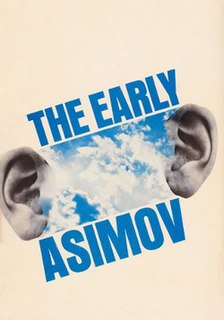
The Early Asimov or, Eleven Years of Trying is a 1972 collection of short stories by Isaac Asimov. Each story is accompanied by commentary by the author, who gives details about his life and his literary achievements in the period in which he wrote the story, effectively amounting to a sort of autobiography for the years 1938 to 1949.

The 5th Indian Infantry Division was an infantry division of the Indian Army during World War II that fought in several theatres of war and was nicknamed the "Ball of Fire". It was one of the few Allied divisions to fight against three different armies - the Italian, German and Japanese armies.
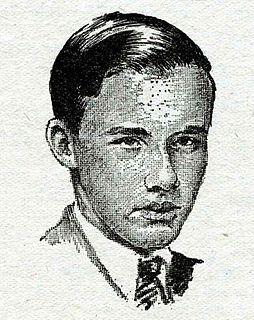
Peter Schuyler Miller was an American science fiction writer and critic.
Marvel Tales is the title of three American comic-book series published by Marvel Comics, the first of them from the company's 1950s predecessor, Atlas Comics. It is additionally the title of two unrelated, short-lived fantasy/science fiction magazines.
Norvell Wordsworth Page (1904–1961) was an American pulp fiction writer, journalist and editor who later became a government intelligence worker. He is best known as the prolific writer of The Spider pulp magazine novels (1933-1943).

Super Science Stories was an American pulp science fiction magazine published by Popular Publications from 1940 to 1943, and again from 1949 to 1951. Popular launched it under their Fictioneers imprint, which they used for magazines, paying writers less than one cent per word. Frederik Pohl was hired in late 1939, at 19 years old, to edit the magazine; he also edited Astonishing Stories, a companion science fiction publication. Pohl left in mid-1941 and Super Science Stories was given to Alden H. Norton to edit; a few months later Norton rehired Pohl as an assistant. Popular gave Pohl a very low budget, so most manuscripts submitted to Super Science Stories had already been rejected by the higher-paying magazines. This made it difficult to acquire good fiction, but Pohl was able to acquire stories for the early issues from the Futurians, a group of young science fiction fans and aspiring writers.

Famous Fantastic Mysteries was an American science fiction and fantasy pulp magazine published from 1939 to 1953. The editor was Mary Gnaedinger. It was launched by the Munsey Company as a way to reprint the many science fiction and fantasy stories which had appeared over the preceding decades in Munsey magazines such as Argosy. From its first issue, dated September/October 1939, Famous Fantastic Mysteries was an immediate success. Less than a year later, a companion magazine, Fantastic Novels, was launched.
The Independent Theatre Ltd., was an Australian dramatic society founded in 1930 by Dame Doris Fitton, and was also the name given to the building it occupied from 1938. It was named for London's Independent Theatre Society founded by J. T. Grein and was one of several amateur drama groups of high standard which sprang up in Sydney, Australia in the 1930s to fill the gap left by the closure of all but two professional theatres. The range of plays essayed was impressive – from classics to avant-garde pieces, from recent West End and Broadway successes to offerings from local dramatists. The death of Doris Fitton's co-producer Peter Summerton in 1969 put extra strain on her deteriorating health, and with no-one able or willing to fill her shoes, the Independent closed in 1977. It was to reopen in 1998, continuing its tradition as a training ground for young actors and playwrights.
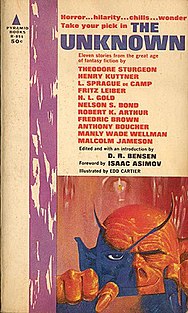
The Unknown is an anthology of fantasy fiction short stories edited by D. R. Bensen and illustrated by Edd Cartier, the second of a number of anthologies drawing their contents from the American magazine Unknown of the 1930s-1940s. It was first published in paperback by Pyramid Books in April 1963. It was reprinted by the same publisher in October 1970, and by Jove/HBJ in August 1978 A companion anthology, The Unknown Five, was issued in 1964.

Unknown is an anthology of fantasy fiction short stories edited by Stanley Schmidt, the fifth of a number of anthologies drawing their contents from the classic magazine Unknown of the 1930s-1940s. It was first published in paperback by Baen Books in October 1988.
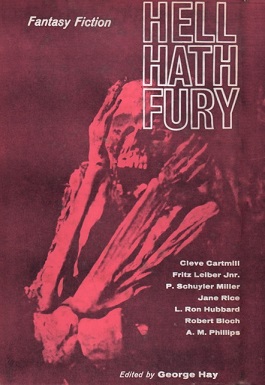
Hell Hath Fury is an anthology of fantasy fiction short stories edited by George Hay, the third of a number of anthologies drawing their contents from the classic magazine Unknown of the 1930s-1940s. It was first published in hardcover by Neville Spearman in October 1963.
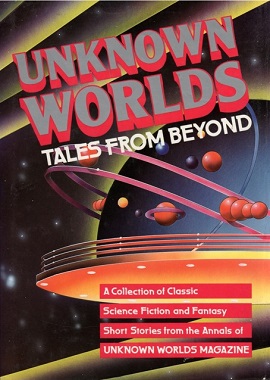
Unknown Worlds: Tales from Beyond is an anthology of fantasy fiction short stories edited by Stanley Schmidt and Martin H. Greenberg, the sixth of a number of anthologies drawing their contents from the American magazine Unknown of the 1930s-1940s. It was first published in hardcover by Galahad Books in 1989, though bearing a copyright date of 1988, and reprinted by Bristol Park Books in 1993.

"...and some were human." is the first story collection by science fiction writer Lester del Rey, originally published in hardcover by Prime Press in 1948 in an edition of 3,050 copies if which 50 were specially bound, slipcased and signed by the author. The stories first appeared in Astounding and Unknown. An abridged paperback edition, including only eight of the twelve stories, was issued by Ballantine Books in 1961. A Spanish translation, reportedly dropping only one story, appeared in 1957.

The Other Worlds is an anthology of science fiction, fantasy, and horror stories, edited by Phil Stong. It was originally published by Wilfred Funk in 1941, with a lower-price edition following from Garden City Publishing a year later. The Encyclopedia of Science Fiction describes it as "the first important sf Anthology".; it remains in the collection of nearly 200 academic libraries in 2015.
This is complete bibliography by American space opera author E. E. Smith.

Science-fiction and fantasy magazines began to be published in the United States in the 1920s. Stories with science-fiction themes had been appearing for decades in pulp magazines such as Argosy, but there were no magazines that specialized in a single genre until 1915, when Street & Smith, one of the major pulp publishers, brought out Detective Story Magazine. The first magazine to focus solely on fantasy and horror was Weird Tales, which was launched in 1923, and established itself as the leading weird fiction magazine over the next two decades; writers such as H.P. Lovecraft, Clark Ashton Smith and Robert E. Howard became regular contributors. In 1926 Weird Tales was joined by Amazing Stories, published by Hugo Gernsback; Amazing printed only science fiction, and no fantasy. Gernsback included a letter column in Amazing Stories, and this led to the creation of organized science-fiction fandom, as fans contacted each other using the addresses published with the letters. Gernsback wanted the fiction he printed to be scientifically accurate, and educational, as well as entertaining, but found it difficult to obtain stories that met his goals; he printed "The Moon Pool" by Abraham Merritt in 1927, despite it being completely unscientific. Gernsback lost control of Amazing Stories in 1929, but quickly started several new magazines. Wonder Stories, one of Gernsback's titles, was edited by David Lasser, who worked to improve the quality of the fiction he received. Another early competitor was Astounding Stories of Super-Science, which appeared in 1930, edited by Harry Bates, but Bates printed only the most basic adventure stories with minimal scientific content, and little of the material from his era is now remembered.















